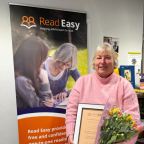
Dementia activist praises carers and tells them: 'You matter'
Over the past couple of years I have been advocating for families living with dementia in addition to leading the Exeter Dementia Action Alliance.
I have witnessed family carers on their knees at crisis point, desperate, isolated with overwhelming feelings of helplessness.
At times I have felt useless, but having immersed myself into the world of dementia over the past decade I realise I have gained invaluable knowledge which I feel able to share and is making a difference. This is a humbling privilege.
Navigating the complexities of the health and social care system is a minefield. I know because I have been part of it and at times I’ve felt as though I have been banging my head against a brick wall.
It’s National Carers’ week and it’s important to highlight loud and clear that unpaid dementia carers, whether they are family or friends provide care to the value of an estimated £13.9 billion per year.
Two out of three people living with dementia live at home.
Unless affected by dementia, people are unaware there are over 100 types of dementia including seven rare dementias which are less talked about and require different support, care and knowledge. This represents additional challenges for families as a whole.
The Care Act 2014 is the law that sets out how adult social care in England should be provided. It requires local authorities to make sure that people who live in their areas receive services that prevent their care needs from becoming more serious or delay the impact of their needs.
Whilst I could write so much, less is more so I wanted to finish off with my 5 top tips which comes from personal experience and responses from carers who say they have reaped the benefits.
- Taking care of yourself often falls to the bottom of the list when you’re caring for your loved one living with a dementia. But looking after your own wellbeing is just as important. You can’t give or care from an empty vessel.
- Build a support network who you can call on. It’s hard to ask for help but you’ll be surprised if you reach out and ask. What may seem like a big ask could create a more mutually fulfilling relationship with a friend or family member. People really do want to help. It might be simply to pick up a pint of milk, a prescription, arrange an appointment, enable your friend to have a couple of hours out to meet their friend, or even deliver an unexpected treat to their front door to raise a smile. Offering verbal help is great but very often people won’t take us up on it so reframing your offer of support by committing to an action like “I’ll drop you off to the xxxx…..” enables the person to lessen their load. We are proud as human beings but all need a helping hand throughout our lives and there’s no shame in asking for it. I’ve learnt over the years people have supported me who I would never have expected.
- Peer support can be worth its weight in gold. Reach out for a Carer’s Assessment. This often leads to an introduction to face to face or online groups where new friends are made who may be going through similar situations. Whilst maybe a cliche, a problem shared is a problem halved. I’ve witnessed the impact of new friendships made as a result of attending a support group. Eventually the group setting may no longer be required but the friendships continue and can be a lifeline.
- Celebrate the quick wins and be kind to yourself as if you are your own best friend.
- Remember YOU matter and you’re doing the best you can but you can’t do it alone.
The Exeter Dementia Action Alliance (EDAA) is a very small charitable foundation which has been raising awareness and creating innovative projects over the last 10 years to make a difference for people living with dementia and their families.
EDAA have delivered over 300 dementia information sessions reaching over 4000 people across the city to help the public understand what it might be like to live with a dementia and feel inspired to take action. We do not offer a direct service but do take a look at the resources below to see what’s available locally and nationally.
Whilst there is currently no cure, the Alliance’s mission continues to engage with committed caring partners, people with dementia and their families to deliver positive and lasting change. Dementia is the biggest health and social care challenge of this century. Together we will keep shining a light on dementia with compassion and empathy.
Some useful local services below followed by national guides, helplines and support groups for carers in no particular order and certainly not exhaustive:
- Age UK
- Devon Carers
- The Filo Project
- The Ness Group
- Admiral Nurse Helpline who also offer virtual clinics
- New Dementia Carer online support groups launching this month with Dementia Carers Count
- Alzheimer's Society
- Dementia Carers Count
- Dementia UK
- Innovations In Dementia
- Rare Dementia Support
- Memory Matters
- TIDE - Together In Dementia Everyday offer an online Carer Development Programme
- Young Dementia UK
- Easy Read Care Act 2014
The brand new national Reading Well dementia booklist has just been launched and comprises a cross section of titles for people with dementia, carers and the public generally. All available to borrow at libraries in England and Wales shortly to be translated into Welsh.
Illustration by Tony Husband from ‘United: Caring For Our Loved Ones Living With Dementia’ by Gina Awad.













